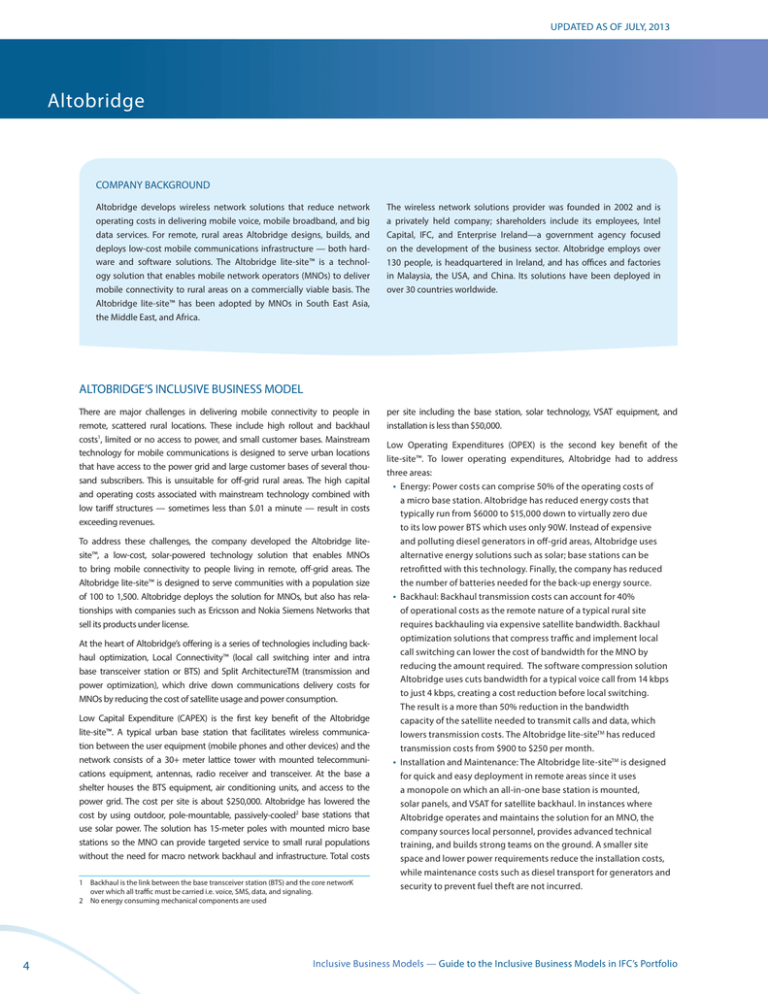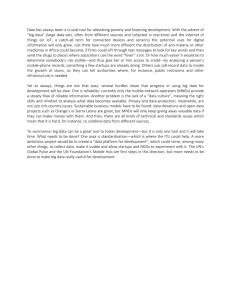Altobridge
advertisement

updated as of JULY, 2013 Altobridge COMPANY BACKGROUND Altobridge develops wireless network solutions that reduce network operating costs in delivering mobile voice, mobile broadband, and big data services. For remote, rural areas Altobridge designs, builds, and deploys low-cost mobile communications infrastructure — both hardware and software solutions. The Altobridge lite-site™ is a technology solution that enables mobile network operators (MNOs) to deliver mobile connectivity to rural areas on a commercially viable basis. The Altobridge lite-site™ has been adopted by MNOs in South East Asia, the Middle East, and Africa. The wireless network solutions provider was founded in 2002 and is a privately held company; shareholders include its employees, Intel Capital, IFC, and Enterprise Ireland—a government agency focused on the development of the business sector. Altobridge employs over 130 people, is headquartered in Ireland, and has offices and factories in Malaysia, the USA, and China. Its solutions have been deployed in over 30 countries worldwide. ALTOBRIDGE’S INCLUSIVE BUSINESS MODEL There are major challenges in delivering mobile connectivity to people in remote, scattered rural locations. These include high rollout and backhaul costs1, limited or no access to power, and small customer bases. Mainstream technology for mobile communications is designed to serve urban locations that have access to the power grid and large customer bases of several thousand subscribers. This is unsuitable for off-grid rural areas. The high capital and operating costs associated with mainstream technology combined with low tariff structures — sometimes less than $.01 a minute — result in costs exceeding revenues. To address these challenges, the company developed the Altobridge litesite™, a low-cost, solar-powered technology solution that enables MNOs to bring mobile connectivity to people living in remote, off-grid areas. The Altobridge lite-site™ is designed to serve communities with a population size of 100 to 1,500. Altobridge deploys the solution for MNOs, but also has relationships with companies such as Ericsson and Nokia Siemens Networks that sell its products under license. At the heart of Altobridge’s offering is a series of technologies including backhaul optimization, Local Connectivity™ (local call switching inter and intra base transceiver station or BTS) and Split ArchitectureTM (transmission and power optimization), which drive down communications delivery costs for MNOs by reducing the cost of satellite usage and power consumption. Low Capital Expenditure (CAPEX) is the first key benefit of the Altobridge lite-site™. A typical urban base station that facilitates wireless communication between the user equipment (mobile phones and other devices) and the network consists of a 30+ meter lattice tower with mounted telecommunications equipment, antennas, radio receiver and transceiver. At the base a shelter houses the BTS equipment, air conditioning units, and access to the power grid. The cost per site is about $250,000. Altobridge has lowered the cost by using outdoor, pole-mountable, passively-cooled2 base stations that use solar power. The solution has 15-meter poles with mounted micro base stations so the MNO can provide targeted service to small rural populations without the need for macro network backhaul and infrastructure. Total costs 1 Backhaul is the link between the base transceiver station (BTS) and the core networK over which all traffic must be carried i.e. voice, SMS, data, and signaling. 2 No energy consuming mechanical components are used 4 per site including the base station, solar technology, VSAT equipment, and installation is less than $50,000. Low Operating Expenditures (OPEX) is the second key benefit of the lite-site™. To lower operating expenditures, Altobridge had to address three areas: •• Energy: Power costs can comprise 50% of the operating costs of a micro base station. Altobridge has reduced energy costs that typically run from $6000 to $15,000 down to virtually zero due to its low power BTS which uses only 90W. Instead of expensive and polluting diesel generators in off-grid areas, Altobridge uses alternative energy solutions such as solar; base stations can be retrofitted with this technology. Finally, the company has reduced the number of batteries needed for the back-up energy source. •• Backhaul: Backhaul transmission costs can account for 40% of operational costs as the remote nature of a typical rural site requires backhauling via expensive satellite bandwidth. Backhaul optimization solutions that compress traffic and implement local call switching can lower the cost of bandwidth for the MNO by reducing the amount required. The software compression solution Altobridge uses cuts bandwidth for a typical voice call from 14 kbps to just 4 kbps, creating a cost reduction before local switching. The result is a more than 50% reduction in the bandwidth capacity of the satellite needed to transmit calls and data, which lowers transmission costs. The Altobridge lite-siteTM has reduced transmission costs from $900 to $250 per month. •• Installation and Maintenance: The Altobridge lite-siteTM is designed for quick and easy deployment in remote areas since it uses a monopole on which an all-in-one base station is mounted, solar panels, and VSAT for satellite backhaul. In instances where Altobridge operates and maintains the solution for an MNO, the company sources local personnel, provides advanced technical training, and builds strong teams on the ground. A smaller site space and lower power requirements reduce the installation costs, while maintenance costs such as diesel transport for generators and security to prevent fuel theft are not incurred. Inclusive Business Models — Guide to the Inclusive Business Models in IFC’s Portfolio CASE STUDY Altobridge DRIVERS FOR ALTOBRIDGE’S INCLUSIVE BUSINESS MODEL •• Vision to create technology solutions to bring affordable mobile connectivity to remote areas •• Significant unmet demand for mobile connectivity – an estimated 1.6 billion people live in remote rural communities •• Growing demand from MNOs for affordable mobile communications technology in offgrid rural area Altobridge was founded with the vision to remove the technical and commercial barriers that deny remote, rural communities access to affordable mobile voice and internet connectivity. The biggest hurdles to connecting these communities are expensive telecom towers, high power costs, and expensive satellite bandwidth that carries the data. As a result, the capital and operating expenses of a potential deployment create a weak business case for MNOs to serve sparsely populated areas. Altobridge’s founders recognized that MNOs and their traditional equipment suppliers were focused on urban network expansion. The company sought to position itself at the cutting edge of lowcost and efficient off-grid technologies in mobile communications. connected to basic telecommunications services and 1.3 billion are expected to still be living in remote communities in 2030. These areas have micro-economies with a prized high Average Revenues per User (ARPU) segment consisting of farmers, traders, and suppliers who conduct business via mobile phones. Third, as urban markets reach saturation and MNOs seek growth opportunities in peripheral communities, they will require cost-effective technology to deliver mobile connectivity on a profitable basis. MNOs that are first to reach remote villages benefit from first-mover advantages as areas of about 1,000 subscribers can only sustain a single MNO. Altobridge supplies the technology for MNOs to take advantage of this potential growth segment. A second business driver is significant, unmet market demand. About 1.6 billion people are not RESULTS OF ALTOBRIDGE’S INCLUSIVE BUSINESS MODEL •• The Altobridge lite-site™ is deployed in 10 countries; over 750,000 new mobile subscribers connected in remote communities •• The Altobridge lite-site™ has delivered EBITA margins between 65-85%, making a 75% IRR possible for MNOs •• Altobridge recognized as a World Economic Forum Technology Pioneer in 2012 The Altobridge lite-site™ has been commercially deployed in 10 countries: The Falkland Islands (British Overseas Territory), Ghana, Indonesia, Malaysia, Mongolia, Niger, Oman, Papua New Guinea, Solomon Islands, and Tonga. MNOs in these countries have connected over 750,000 new subscribers in remote communities to mobile communications networks. The Altobridge litesite™ has a proven record of delivering EBITDA margins in excess of 65% and as high as 85%, making a 75% Internal Rate of Return possible for MNOs. Higher ARPUs than national averages and a sufficiently large subscriber base per site support a short payback period of less than 24 months and high profit margins. Mobile connectivity via the Altobridge lite-site™ has brought great benefits to remote villages such as Mambi in West Sulawesi in Indonesia. Previously dependent on a single satellite phone, the village now has mobile connectivity through PT Indosat. Mambi and surrounding villages have low population densities, are 2-5kms apart, and are a five hour drive from services such as hospitals. The new mobile phone subscribers report they can compare prices for rice, coffee, and cocoa they wish to sell, obtain health advice without travelling far, communicate with relatives, and better manage day-to-day work. Altobridge has received significant recognition over the years including being named a World Economic Forum Technology Pioneer in 2012 and the GSMA Mobile Innovation Grand Prix Finalist in 2009. Inclusive Business Models — Guide to the Inclusive Business Models in IFC’s Portfolio IFC’S ROLE AND VALUE-ADD Since 2010, IFC has invested $8.125 million in equity in Altobridge. This is critical long-term growth capital for a young company. IFC’s investment will help reduce the risk perception related to Altobridge’s innovative products as few investors are willing to provide long-term equity risk capital for such growth stage projects. IFC’s prior investment experience in companies that are at a similar stage of development is also a key value-add to Altobridge. As Altobridge grows, its relationship with IFC will help the company access other sources of finance to expand into new markets. In addition, IFC will advise the company in corporate governance, insurance, environmental and social issues, financial management, and future capital raising efforts. Finally, IFC can leverage its global industry knowledge as well as relationships with MNOs in the telecommunications industry to assist Altobridge in targeting and accessing companies that could serve remote communities. IFC’s Investment: $8.125 million in equity 5

